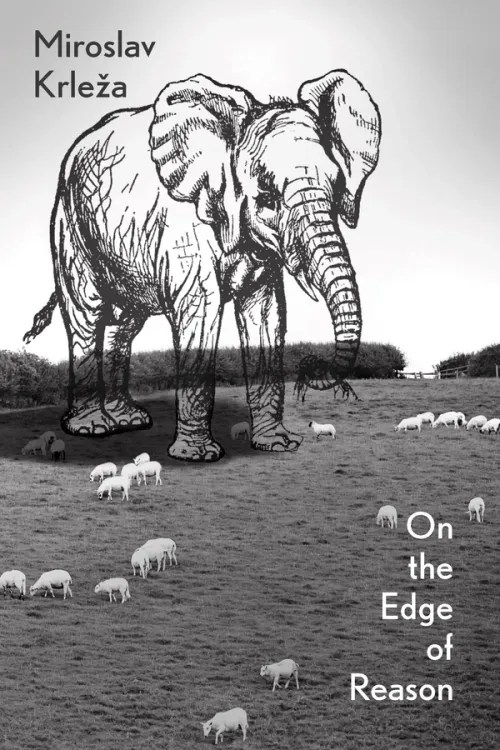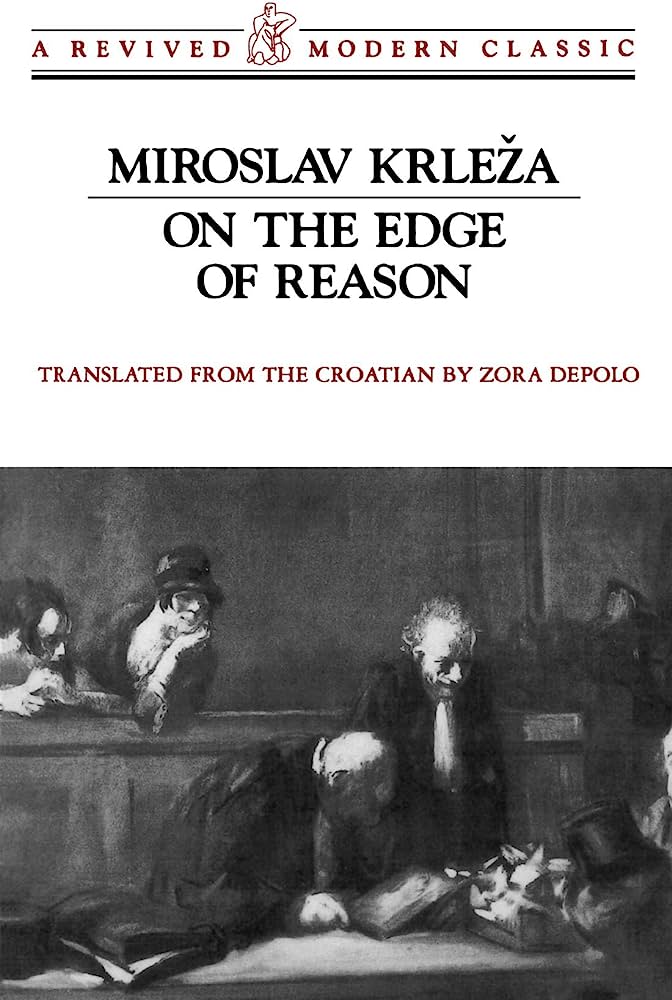
What classic story first comes to your mind when you think of a satire on the hypocrisy of the bourgeoisie or ruling majority? George Orwell’s Animal Farm? J. B. Priestley’s An Inspector Calls? Henrik Ibsen’s An Enemy of the People? Charles Dickens’s Little Dorrit? Edith Wharton’s The House of Mirth? French literature has a long tradition of such stories, so, perhaps, some story by Molière, Honoré de Balzac, Émile Zola, or Guy de Maupassant? The choice is numerous, but, whatever it is, chances are it would not be Miroslav Krleža’s novel On the Edge of Reason (1938). And, yet – it should be. This novel by one of the greatest Croatian writers of the twentieth century should be on everyone’s lips when evoking stories about the challenge to that prevailing social order that curbs individual freedoms and rights, leading to injustice.
Prolific and versatile author Miroslav Krleža (1893 – 1981), who wrote novels, essays, poems, plays and short stories, was aptly placed to tackle the theme. His stark criticism of the ruling elite’s egoism, greed and the perpetration of social injustice in his fiction is the reflection of his country’s turbulent political history and his own innate desire to challenge the status quo. While being an officer in the Austro-Hungarian Army, Krleža once unsuccessfully deflected to the Serbian Army, and his embittered experience as a soldier on the frontlines during the World War I culminated in his powerful anti-war writings, including a short story collection titled Croatian God Mars (1922). After the World War I, Krleža emerged as a talented writer promoting socialism, and because of his leftist views, his books, publications and left-wing magazine Plamen had been banned in the inter-war period. In 1939, Krleža was expelled from the country’s Communist Party as his opinions on art contrasted with the social realist principles, and this further cemented his independent, “anti-establishment” public image.

Krleža would change his political ideologies a number of times during his life, but one thing remained unwavering: his belief in the power of literature to touch and influence millions of hearts and minds. Thus, taking inspiration from Scandinavian drama and German expressionism, as well as such authors as Friedrich Nietzsche and Marcel Proust, Krleža would champion a new modernist movement in the Croatian literature, eschewing previously-held social realism ideas in fiction, and insisting that literature reflects the plight of the disadvantaged and the condemnation of the wrongs of the bourgeoisie. In that vein, Krleža’s Glembays cycle of plays, comprising of Messrs. Glembay (1928), In Agony (1928), and Leda (1932), is about the rise and fall of the aristocratic Glembay family, and The Return of Philip Latinowicz (1932) is a novel about one disillusioned painter who returns home to find hypocrisy and corruption ruling the abode of his childhood, as well as the fact that it is not so easy to escape the shackles of one’s traumatised mind as he re-discovers his identity. The latter story is also the one that underlines the nihilistic passivity of a hero in the face of observed oppression, a trait which would later also characterise some protagonists in the works of J. M. Coetzee. Then, in 1938, just a year before the Croatian Peasant Party successfully negotiated with the royal dictatorship for a partial restoration of Croatia, Krleža’s novel On the Edge of Reason was born.
Translated from the Croatian by Zora Depolo and first introduced to the English-speaking readership in 1959, On the Edge of Reason can be said to be a little different from Krleža’s major plays and short stories. Its main focus is not so much the upper-middle-class’s “internal disintegration”, hastened by its own conceit or mode of thinking, perhaps similar to Ibsen’s plays, but, rather, the societal, collective attack of “folly” on one individual who dared to express himself freely and state the “truth” openly for the first time. By speaking his mind for the first time, that person rebelled against the well-regulated world of societal fakery and its implicit rules, and, so, the society devised a punishment. Viewing it in that light, the story bears similarities with the existential literature of both Jean-Paul Sartre and Albert Camus. Krleža also abhorred Stalin’s purges, and might have also tried to portray the dangers of these senseless and inhumane persecutions in his book, while also relying on his own experience of being numerously “punished” for the failure to conform to a series of governmental rules.
On the Edge of Reason follows a nameless middle-aged lawyer, who, for a brief moment during one social gathering at the mansion of one prominent and highly influential businessman, Director-General Domaćinski, had the audacity to speak his own mind. Upon hearing Domaćinski’s boast that the latter shot (“like mad dogs”) and killed four people who allegedly tried to steal his wine in revolutionary times, our nameless narrator voiced his thoughts out aloud: this was not some form of heroism on his host’s part, but a “crime, a bloody thing, moral insanity”. After this statement, the world of our protagonist, who before led an unassuming, dignified existence, would never be the same again.

The first chapter of the novel is dedicated to the discussion of “human folly”, personified by the so-called homo cylindriacus, a species of bigoted men who always follow the opinions of their equally bigoted crowd, who, in turn, is only interested in the preservation of its own inflated ego, made-up reputations, over-embroidered appearances, and materialistic outlooks. In the following chapters, Krleža, in a farcial, comically-sardonic fashion, details our nameless lawyer’s societal “fall” as he starts to be pestered and persecuted by the very society he once so dutifully served and, at least publicly, venerated. Our protagonist’s resistance to apologise to Domaćinski for his remark or make any amends for his public encroachment on the sacredness of the bourgeois ideals tests him and the others to the limit. The consequences are not long in waiting. Our nameless hero’s “insane” obstinacy and opposition are met with a show-trial, imprisonment, and the complete breakdown of his social, familial and professional lives.
Even the evidence of our nameless narrator’s quietly-led, insignificant past life and passive, welcoming temperament do not save him from the society’s condemnation. No matter how spotless one’s history was before a faux pas, it would be re-written by society to match its present, already-formed, opinion of one. Krleža makes not so subtle point that high society would always be on the side of those with the most influence and power, and it would be afraid to stand up for truth and morality emanating from just one person. Leo Tolstoy’s Anna Karenina and Edith Wharton’s The Age of Innocence demonstrated only too well how one individual connected to high society would be quite unable to break away from its iron-tight grip or strict rules unscathed. These “rebels” would not be allowed any dramatic misstep in the well-orchestrated waltz of order and convention, taking place in one stifling atmosphere and overseen by one unforgiving and egoistical society. Moreover, such “weapons” as branding one “insane” and spreading malicious rumours would be used against any “dissident”.
However, though On the Edge of Reason does possess more than a trace of such a classic drama, its language and spirit could be said to be closer to the works of some existentialist satirists, and one of them is Krleža’s European contemporary – Swiss writer Friedrich Dürrenmatt (1921-1990), who might have been inspired by Krleža. In Dürrenmatt’s play The Visit and novel Once a Greek, there is the same exposé of the “human folly” of the ruling elite, with the Swiss master employing much wit to demonstrate the frivolity and corruption of the ruling elite/influenced dominant majority, and how easily it would be willing to sacrifice a person and individual justice when its vanity is wounded, its materialistic values are under attack, and the exposure of its falseness is imminent.
Krleža also ridicules the legal and bureaucratic procedures to which our narrator becomes a subject in this story, and this does echo the work of Franz Kafka, mostly evidently The Trial. However, while Kafka often simply pinned his bewildered protagonist against incoherence and inhumanity dressed in the clothes of law and order, Krleža weaves in a more humanistic thread into his narrative. On the Edge of Reason sends out the message about the need for sympathise with the fate of others, especially the poor, injured and disadvantaged. Life is unpredictable and anyone can join their ranks at any time. Thus, Krleža’s narrator makes friends with criminal Valent Polenta, a man jailed for shooing a forester who caught him poaching, and wronged woman Jadviga Jesenska, who suffered much in her life because of societal prejudice and discrimination. Their stories are told, and the narrator’s suspicions about the workings of the world and that soul-crushing societal climb to illusionary success are finally confirmed as he chooses freedom over comfort, a principle over a societal position.

The Croatian author’s point is that it is much easier for people to follow the majority’s perception of “convenient truth” and their class’s prejudice than risk becoming unpopular or ostracised by standing up for something that one believes right in one’s heart. “Since we are stuck in this confused, chaotic, and unsettled world and have our own outlooks on life, it is easier to sail with a compass, however cheap it may be, than according to the stars, especially when it is cloudy, as it is in our case”, says our narrator, who is growing increasingly isolated in his situation, but whose zealous polemic is becoming more subdued as the narrative’s focus slowly shifts to the plight of other “societal outsiders” in this story.
Krleža’s literary achievements were recognised during his lifetime as the author was nominated fourteen times for the Nobel Prize for Literature, from 1958 to 1972. However, he never won, and died in Zagreb in 1981 at the age of 88. The Yugoslav Institute for Lexicography, an establishment that he founded in 1950, was re-named after him.
⚖️ On the Edge of Reason is not just another under-read classic by an eminent author waiting to be re-discovered in the West. It is topical now, in our present time, when cancel culture continues to flourish and there can always be found that unforgiving, “righteously-minded” segment of society determined to put an offensive label on, or punish anyone, be they a celebrity or not, for the mere fact that their opinion is different from that of the visibly predominant group. What happened in our time of the famous freedom of speech dictum: “I disapprove of what you say, but I will defend to the death your right to say it”? (Evelyn Beatrice Hall). In the 1930s, when Krleža wrote On the Edge of Reason, he might have had a different political or social situation in mind, but his novel still remains that powerful warning against the “madness of the masses” determined to burn at the stake any speaker of a dissenting view. On the Edge of Reason is a penetrating existential satire deserving its place on a shelf of every admirer of world literature.


Alright, you convinced me. I’m reading ‘On the Edge of Reason’ by Miroslava Krleza. I also think that Croatia with all its beaches must be one of the top vacation spots in Europe soon.
You might want to stop by my site tomorrow to see my next post.
LikeLiked by 1 person
Thank you for this post Diana, and all the background on the author and his work. Fortunately, both of my local public library systems have this book, so it immediately went on my TBR.
LikeLiked by 1 person
Thank you for the detailed and interesting analysis, Diana. Very helpful and a pleasure to read.
LikeLiked by 1 person
wow, thanks so much for this. Just added it to my TBR
LikeLiked by 1 person
Many years ago I read ‘Harbor Rich With Ships’ and more recently came across a very old Croatian language version of On The Edge of Reason in my uncle’s home library. I’ll have to revisit it now for sure!
LikeLiked by 1 person
Tremendous post, Diana! Delivered like a true scholarly judge, jury, and executioner⚖️ I love the bonus quote by Evelyn Beatrice Hall about Free speech in the final paragraph, which ties the theme up like a bow. And of course am adding this to my reading list. I (had) heard of this, but never read… Bravo👏🏻
LikeLiked by 1 person
I have read most of the ones you mentioned but never heard of this one. Definitely in my next book order. Thanks.
LikeLiked by 1 person
What a great collection! Thank you for this!
LikeLiked by 2 people